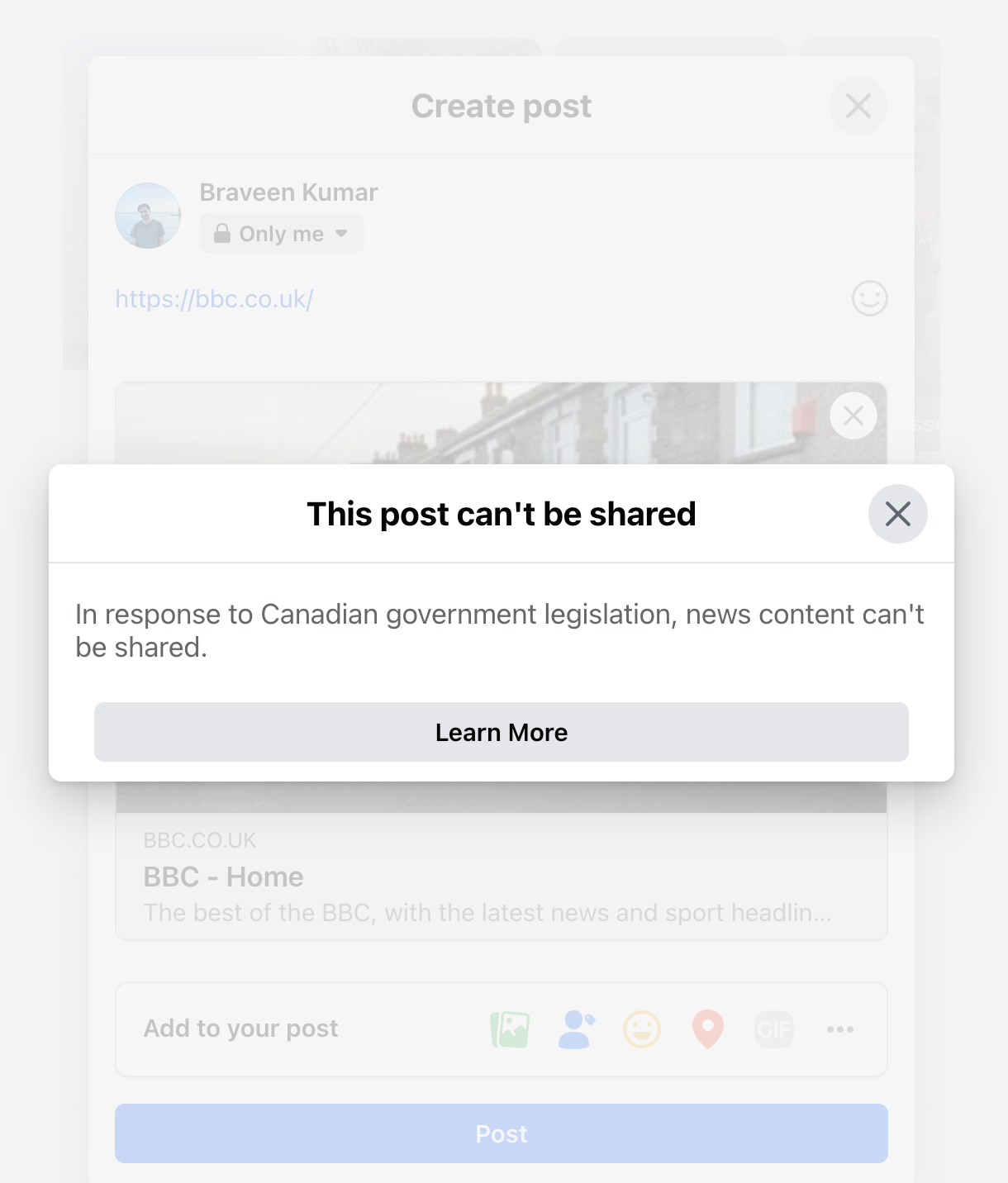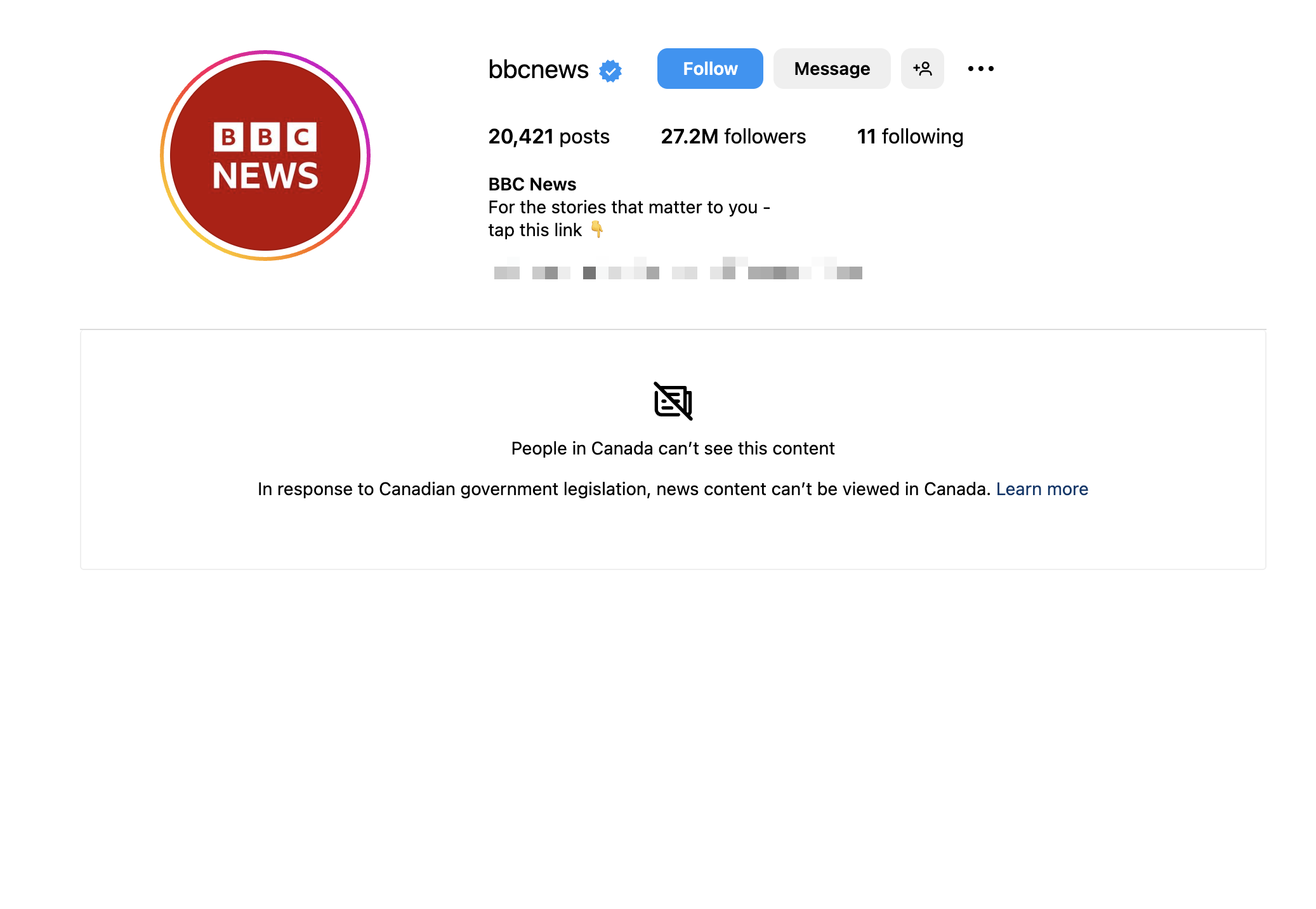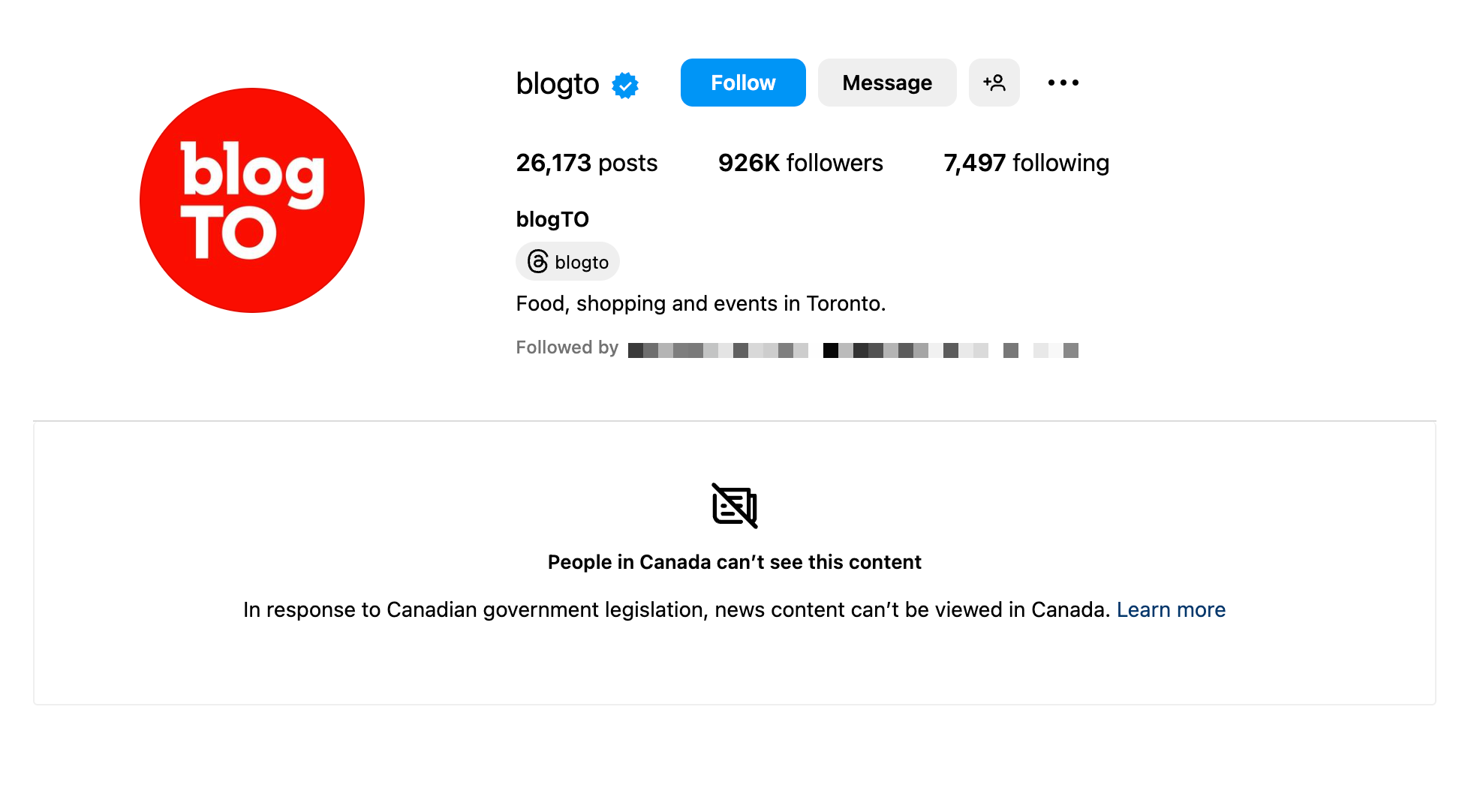I'm not exaggerating when I say this blog post written by a random nobody (me) can reach more Canadians on Instagram and Facebook right now than the biggest news outlets around.
If you spell colour with a U and buy your milk in bags, Meta won't let you see or share news in its social media apps. Visit the profile of any major news org, or try to share a link to an article, and this is what you'll see:


Meta's news blackout doesn't just apply to Canadian media like CBC News and The Toronto Star, but all news outlets from BBC to Fox News that employ journalists to "serve the public interest".
In fact, the closest thing you'll find to news is entertainment stories, screenshots of article headlines, original news videos re-uploaded by so-called "content curators" (AKA "thieves"), and hard-hitting pseudo-journalism like 6ix Buzz.


Not the news we need, nor the news we deserve.
It's no wonder most Canadians I talk to about this either haven't noticed or have forgotten it's happening. The news may have disappeared, but we were left with news-ish substitutes.
So how exactly did we get here?
From the company that popularized Fake News comes... No News
Meta—which owns Facebook, Instagram, and probably 59% of our attention span in this reality and the virtual one—says the news ban was a response to Canada's Bill C-18, now the Online News Act after it became law in June of 2023.
This legislation was designed to give media businesses more bargaining power with the big tech companies that have allegedly contributed to the downward spiral of Canadian journalism.
It's a position that has some merit when Facebook, which trained the media for years to build their audiences on its digital land, has been reducing the reach of links to articles, forcing news outlets to either:
- Pay for ads to ensure their articles get in front of their own audience.
- Play by the unwritten rules of Meta's algorithm, which prioritizes video content that keeps people on the platform instead of clicking out to articles.
Neither of these make sense for a media business model that relies on monetizing website traffic with ads. But they do make sense for social media platforms that don't want people leaving for another site—unless they pay the toll (i.e. click an ad).
So, inspired by Australia, the Canadian government came up with the Online News Act, an attempt at regulation that subsidizes Canada's struggling news industry by targeting platforms like Facebook and Google to pay up.
The Online News Act is a flawed solution to a genuine problem. A lot of people (understandably) blame the Canadian government for the news ban. But where the government may have been incompetent, Meta has been (for lack of a better word) a real dick about it.
Consider that:
- Facebook alone has almost as many Canadian users as Canada has Canadians (over 70% of Canada's population has a Facebook account).
- A lot of people use Facebook and even Instagram to stay informed and discuss current events. A PEW Research study in 2023 found 43% of Facebook users surveyed said they "regularly get news from the site".
- Facebook still remains one of the biggest conduits of misinformation online and requires the presence of quality journalism as a counterbalance.
The part that gets me though, and why I'm writing about this at all:
By banning news in Canada, Meta has essentially killed two loons with one toonie—dodging regulation and censoring any journalism that might criticize it at all.

Is Meta's VR headset on too tight?
Unlike Meta, Google struck a deal with the government to pay $100m a year in order to comply with the Online News Act—a drop in the bucket for the world's most popular search engine. It's not the win it sounds like for the Online News Act, but it's way better than us losing access to news in the world's biggest search engine too. Especially now.
Yes!
— braveen (@braveenk) December 16, 2022
Let’s demonize journalism just as we perfect deepfake generative AI tech and roll it out to the masses 🤗🫡💯
This is a great idea. What can go wrong?
Meta has taken a different stance though, strong-arming the Canadian government with mostly straw-man arguments in its official statement:
"News content is not a draw for our users and is not a significant source of revenue for our company."
It's true that news is a bigger headache than a money-maker for Meta. In fact, the news ban has had almost no effect on Facebook usage among Canadians.
Despite Facebook coming back to news over the years like a toxic ex, with products like Instant Articles, the magazine-inspired Paper app, and more recently the Facebook News tab, all of them have failed to take off.
News might not be why people open Instagram (I assume it's to see pictures of other people's lunches and reposted TikToks). But news is an undeniable part of Facebook's DNA that Meta has been increasingly distancing itself from over the years.
Social media has become integral to our news ecosystem for better or worse. That may not matter in virtual reality where Meta is headed, but it does matter in this one.
"Posts with links to news articles make up less than 3% of what people see in their Facebook feed."
Now do a stat that includes screenshots of articles, video content produced by news teams, and all the posts sparked by discussions about current events.
But taking it at face value, that 3% is something Meta directly controls as it's been actively reducing the digital footprint of hard news in its apps for years. So going from less traffic to practically none is the final nail in the coffin for Canadian news businesses.
This trend isn't unique to Facebook and Instagram. A while back, Twitter (now X) removed headlines from link shares in the app, making articles way less clickable as you can see below.

The "death of legacy media" is being sold to us as a result of dwindling demand—the free market just free-market-ing. When in reality, social media platforms have their fingers on the trigger.
The legacy media is dying https://t.co/njUqEkm310
— Elon Musk (@elonmusk) April 3, 2024
Meta took away the free press, but left us paid ads
There's no denying the Online News Act needed more time in the oven. But what's worse is a company as influential as Meta acting like a bully while playing the victim, assuming the moral high ground while taking the low road.
Meta says it tried its best to find a solution with the Canadian government. But I'm willing to bet it didn't try very hard, only considering profitable "win-wins", which to them probably means winning twice.
Meta pulling news content from Canada is a lot different from Lyft pulling out of Minneapolis or Pornhub pulling out of Texas (pun intended on the last one) as a result of over-reaching government regulation. For one, neither ride-sharing nor porn-watching are referenced in the Canadian Bill of Rights.
A lot of people like to criticize the media (I do too). But a free press is a pillar of democracy and an extension of free speech, which we seemed to care a lot about when Kanye got banned from Twitter.
Even with all its flaws, journalism at least tries to abide by higher standards, like issuing corrections when it gets the facts wrong and finding credible sources. For all the bad, there is still good, essential journalism that exposes corruption and keeps governments and corporations in check.
The news disappearing from some of our most frequented feeds is a story that should be making headlines. And it is. The fact that we can't actually see them in the apps we use daily is mass censorship. The fact that Meta instead directs us to a page that basically says, "Blame your government," is a masterclass in corporate gaslighting.
If Meta muting the news doesn't seem like a big deal to you, just know that they blocked BlogTO too.

Meta made its bed in our news ecosystem. Now it wants to sleep elsewhere.
It's unfortunate that today's media ecosystem rewards sensationalism and oversimplified truths, something that every single person looking to reach an audience online is susceptible to, not just journalists. If you want exposure through these algorithms, you better be ready to dance for them. That's why every YouTube thumbnail these days is one of these three faces 😳🫣🤔.
Social media means we're part of the media now too—whenever we consume, share, and comment on the news publicly.
I get that a business has to look out for its bottom line first and that "free speech" is a protection that applies to governments and not businesses. But Meta isn't Foot Locker. It's one of the most powerful companies in the world, making 12-figures a year from the attention and information economy.
Instead, Meta seems to be doubling down on turning its apps into a digital lala land, recently releasing a filter to limit political content on Instagram and Threads (with Facebook to follow), and quietly opting us all in by default.

It feels like Meta is abandoning the role it carved out for itself in our news ecosystem, along with the responsibilities that come with it. The Online News Act was just an excuse to take it further.
No news is bad news for us as a society, but it's great news for Meta as a business.
After all, I can't think of a better environment to sell ads than to blissfully ignorant users in feeds free of bad news.

